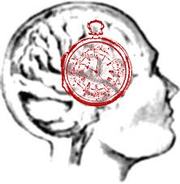|
A few days ago, I was trying to remember a line in a song I had heard about 9 months ago. I heard the song at a karaoke event, and the singer had a funny accent and demeanor. I vaguely remembered the line contained an alliteration, and with that clue, combined with the funny accent, I was able to remember the moment after about 30 seconds of thought.
It was those 30 seconds that then caused me to wonder how my brain did that. First of all, I was quite surprised I even could conjure up the memory, which was quite unimportant. Thus, the fact that I could do it in 30 seconds was surprising; however, why did it have to take 30 seconds? What was going on inside my skull? Was some huge table being scanned? Some map-reduce operation being done? Were old neural connections being dusted off and re-energized with electrical current for my old memory to be resuscitated? What's neat is that our brain consolidates memories and continues to work on solving problems and answering search queries while we sleep. What's crazy to wonder about is what part of "us" controls it while we sleep.... As far as I know, the brain doesn't operate at a typical "clock speed" like computers do (where the clock speed dictates how often a CPU goes from instruction to instruction). But what does control how quickly our brain works? Clearly it changes in speed and function over time as we age, and its speed can deteriorate with various diseases. So there must be something biological/physical that somewhat resembles clock speed. IQ? From a quick search, this article tries to tackle this question, but at a very high level (and the article's somewhat old). That got me thinking about another clock in our body, something a lot more like the clock on our wall and in a computer: our body's internal clock (circadian rhythm). I bet there are lessons both biologists and computer scientists can learn from each other in examining the parallels between our body's clock, our brain's "clock," and our computer's clock. And finally, how does parallel processing work? In a computer, it's like having separate little brains that can do very basic tasks like read and store numbers and arithmetic; but in our brain, is it that multiple neural connections are being formed continuously and it's just a matter of which ones happen to grasp our attention at any one time? As far as I know, people aren't really able to take a large problem, split it up into many parallel parts, and assign those different sub-problems to separate mini-brains. Or are we? Is that what intuition does? Or does intuition just leap ahead magically to some final answer and not worry about sub-problems at all? All of these questions fascinate me and make constantly wonder how our brains function deep inside.
1 Comment
S
8/5/2011 11:24:19 am
I wonder with whom you experienced the karaoke and the memory of it (nothing like V singing "I liiived my life"). I also wonder who inspired you to consider circadian clocks, and neuroscience in general? As usual, no credit.
Reply
Your comment will be posted after it is approved.
Leave a Reply. |
Archives
June 2024
Categories
All
Subscribe |

 RSS Feed
RSS Feed
